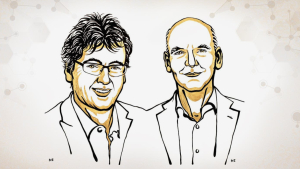In South Carolina, a grieving mother whose son Jackson took his own life distributes stickers to teenagers. The sticker reads "Jackson Matters and So Do You" – to German: Jackson is important, and so are you. You are important« is also the slogan of the National Hotline for Suicide Prevention. And the phrase "Black Lives Matter" draws attention to the racism that more than one in eight people in the U.S. faces.
For about 30 years – and today more than ever – "mattering" has been considered a psychological construct that can reveal a lot about a person's health: about depression and suicidal thoughts, about further mental suffering and even about the physical resilience of older people. There is an increasing consensus that the feeling of one's own significance is something psychologically independent. "There is no other construct for the human need to feel valued and considered important by others," says Gordon Flett of York University in Ontario, author of the 2018 book "The Psychology of Mattering".
Mattering overlaps with the feelings of self -esteem, social support and belonging, explains the psychologist. But it is not the same. If someone does not feel important, this can be changed comparatively easily: "People can learn to get involved with others who promote their own feeling of importance."
"Mattering" can be measured
In 1981, the US sociologist Morris Rosenberg developed a five-stage "meaning scale" with questions such as "How much are other people dependent on you?" And "How much would you be missing if you went away?" Rosenberg, known for his Rosenberg self-esteem scale, did not test the Mattering scale itself. At the beginning of the 1990s, he proposed to sociologist R. Jay Turner at a beer at an annual conference to add questions to a big study in Toronto, Canada . The data from this survey then evaluated his student John Taylor, now a sociologist at Florida State University, in his doctoral thesis.
Taylor intuitively understood the scale, but at first he doubted whether it was really something new or just another label for self-esteem. But in 2001, according to a study conducted by him, the last doubts disappeared. "Mattering is different from self-esteem, social support and other factors," says Taylor. "It's an important part of the self-concept.«
In the following years, more and more mattering tests were created, including the "anti-mattering scale" by Gordon Flett with questions such as "To what extent have they been felt that they are invisible?» And the "Work Mattering Scale" developed by AE-Kyung Jung and Mary J. Heppner at the University of Missouri. Scientists can also measure the feeling of meaning for the family, the university, community and society. A scale even captures the meaning for the partner.
Brown University sociologist Gregory Elliott distinguishes three components of mattering. First, "being noticed": do people pay attention to you, or do you pass by them? Secondly, "being important": do you have people who are really interested in your well-being? And thirdly, "being able to rely on": are there people who would ask you for help, support or advice?
The feeling of one's own importance (or unimportance) begins in childhood, says Flett. "What makes the neglect by the parents so destructive is the message that she sends to the child," says Flett. "It then feels irrelevant, invisible and insignificant."
What Mattering means for Health
This has serious consequences for teenagers. In a study with 2000 young people from 2009, Elliott found that the fewer young people had the feeling that they were important to their own family, the more they showed anti -social, aggressive or self -destructive behavior. Conversely, if you think you are important for your family, you get less easily on the wrong track. Psychologist Robin Kowalski from Clemson University evaluated the contributions of teenagers on the Reddit page »Suicide Watch«. "About half had the feeling that it was not important," she says.
John Taylor had already found out in his 2001 study that the feeling of being important to others is associated with mental health. In 2018, he also discovered a connection with physical health. He and his colleagues Michael McFarland and Dawn Carr had extensively surveyed more than 1000 adults in the US state of Tennessee and collected physical measurements such as blood pressure, cortisol levels and hip-waist ratio from them.
The team found that the less people had the feeling that the health suffered more to others. "Even small differences in Mattering say physical and mental health better beforehand than social support," reports Taylor. Social support is considered a decisive factor in describing physical resistance, but can also be related to disturbed relationships with the family. "Mattering is a better measure," he says. "It only includes the positive effects of close personal relationships."
Psychologist Isaac Prilleltensky from the University of Miami believes that the feeling of importance is due not only to personal relationships, but also to work and community. Prilleltensky has developed his own scale for this extended measure: "Mattering in Domains of Life Scale". It allows to assess the extent to which a person feels valuable, recognized and appreciated and whether he feels that he is contributing to the well-being of others.
Prilleltensky created the image of a wheel. The focus is on "Mattering", then two semicircles follow: "Feel valuable" and "create value", which are in the interrelation of the external circle, the areas of "self", "relationships" and "community". The goal is to create a positive cycle "in which the advantages of the feeling of appreciation lead to value creation," as he writes. The more one person gets the feeling of being important for others, the more likely she makes a contribution to her and thus again receives attention and recognition.
Mattering scales are also increasingly being used in the work environment. A team led by psychologist Julie Haizlip, professor of nursing and pediatrics at the University of Virginia, asked about burnout symptoms in a national survey. The group found that those who felt more important for patients and colleagues were less burned out.
"In health care, it seems to be more about the interpersonal than the organizational. Meaning comes from the little things," says Haizlip. This may include holding the hand of a frightened patient or having colleagues co-order lunch for each other. In a recent study, Haizlip found that it can be quite easy to convey a sense of importance – for example, to remember the names of students in medicine or nursing.
The feeling of being important is also related to the gender. Women reported "almost consistently" about a higher level of importance in their relationships, says Taylor. That was already the case in the 1990s and is no different today, even though the roles of women have changed.
Both men and women derive a sense of importance from close relationships, but women derive more from their role as parents and close friends, a recent study by sociologists Rebecca Bonhag and Paul Froese of Baylor University found. For men, the feeling is therefore more likely to arise from how they perceive their status within a community, for example through membership in a group. For example, a donation to local organizations contributes to this for men, but less for women. Men who identified strongly as Republicans and were active on social media felt a stronger sense of importance. Such a correlation was not observed in men who were politically independent or democratically oriented.
The cause is unclear, but Bonhag speculates, a strong political identification could convey a feeling of meaning that have previously missed this feeling. If that is the case, she says, "that would be a worrying trend". On the other hand, she suspects that social media help men feel connected to others in a way that women do with their close relationships.
The feeling of not being important to other people is also associated with thoughts of suicide and even murder. Several scientists have partially attributed rampages to this. The 2007 Virginia Tech assassin left a terrifying manifesto: "None of you know who I am, so I have to show you that I am important," sociologist Gregory Elliott quotes from it. A study from the year 2003 examined media reports about writings of ten murderers. Flett describes a consistent theme as follows: "I was given the feeling that I am not important, but I am more important than you are aware of.«
You can learn mattering
As mattering is receiving more and more attention, it is now being integrated into mental health measures in the USA. An important example of this is the "You Matter Lifeline". A call to the 988 phone number can make people with suicidal thoughts feel that someone is listening to them and they are important to another person.
At MCMaster University, psychologist Christine Wekerle and her colleagues "JOOPOP", a telephone app for young people, test. It is intended to help to understand your own mood, to distract yourself from negative thoughts and to establish social contacts. According to Wekerle, this should "convey the feeling of being important because you do something positive for yourself".
Some US municipalities also offer mattering activities for young people. Kini-Ana Tinkham, director of a resilience network in the US state of Maine, points to a health study from 2021: according to this, 51 percent of children in high schools and 45 percent of those in middle schools believed that they did not play a role in their communities. As a result, the state launched an initiative to raise awareness of the issue of mattering.
When a librarian noted that young people smoked on an empty property after school, he offered them to design a storage room as a youth club. A local outdoor program, "Teens to Trails", set up a advisory committee for young people to ensure that "we do not make a decision about you without you," as the managing director Alicia Heyburn formulated. And in the US state of Michigan, researchers found that school children develop a stronger feeling of importance through the opportunity to get involved and have a say.
Ways out of trouble
Do you sometimes remember to take your life? Does life seem meaningless to them or their need? Do you have no hope anymore? Then please contact contact points that can help people in crisis situations: family doctor, resident psychotherapist or psychiatrist or the emergency services of clinics. The medical on -call service provides contacts on the phone number 116 117.
The Telefonseelsorge provides advice around the clock, anonymously and free of charge: by phone at the nationwide valid numbers 0800 - 1110111 and 0800 - 1110222 as well as by e-mail and in the chat on the site www.telefonseelsorge.de . Children and adolescents can also find help by calling 0800 – 1110333.
According to Kiniana Tinkham from Maine, it makes a difference when the children are simply noticed-for example, when a shopkeeper says: »Justin, I've not seen you for a while. How are you? ”Many interventions take place spontaneously without it having an institution. Young people can join groups, volunteer. Helping others increase self -esteem. Research shows that older people develop the feeling of being more important for others if they interact more with others on Facebook.
It already helps a neglected child if a trusted person – be it a relative, a teacher or a caregiver – takes care of him and pays attention to him. But as reports from clinical practice say, sometimes many changes are needed to make people feel that they are important to others. But it is not impossible. And feeling important to someone can go a long way, says Flett. "You can no longer think that you are unimportant.«
© Springer Nature Limited Scientific American, Do You ’Matter’ to other? The Answer Could Predict Your Mental Health, 2022



















